'Don't just criticise, create!': Interview with Francesco Giubilei, founder and director of “Nazione Futura”
This is the ninth instalment of our new interview series, called “Don’t just criticise, create!” David Engels speaks with European artists, philosophers, priests, intellectuals, activists, and artisans who have each decided not only to lament 'the decline of the West' but also to endeavour to help reverse it. They are doing this by making something new, and also perhaps something beautiful, true, and good.
David Engels: Dear Francesco, you are the founder and director of „Nazione Futura” and now special advisor for the Italian Minister of Culture Gennaro Sangiuliano. Could you explain in a few words the objective and activities of “Nazione Futura”?
Francesco Giubilei: Nazione Futura was founded as a think tank in 2017 with the objective of fostering debate and discussion between various souls of civil society united by shared values. Future Nation operates at three levels: international, national and territorial one. At the international level through its network of relations and conservative think tanks; at the national level by putting forward proposals to the political world, together with implementation of events and manifestations, papers, dossiers; and in the territories -through territorial circles operating in over 70 Italian cities.
What was the individual path that has led you to the decision to found “Nazione Futura”?
Until a few years ago, in Italy hardly anybody called themselves a conservative. Although there is an important tradition of conservative thought in Italy, in the 20th century there was never a conservative party in the country. Many people who were conservatives from some point of view did not call themselves conservatives – in opposition to other countries, such as Great Britain, featuring a party in the government called Conservative Party. Our goal when we founding “Nazione Futura” was to create a conservative think tank trying to spread ideas and values related to that political and cultural area. After more than five years, we have achieved many important results, but there is still a long way to go.
In popular culture, Italy is often considered as home to the Catholic church, as a sanctuary of art and beauty, as realm of the “famiglia” and as a country incredibly proud of its history. Yet, at the same time, all forms of Marxism have always been surprisingly strong in Italy. How do you explain this dichotomy – and how would you assess the current situation?
Italy is one of the most Catholic nations in the world: the Vatican, seat of the Catholic Church, is within Rome, and this has influenced Italian history and the character of Italians not only from a religious but also from a cultural point of view. Even those who are not believers must recognise that Catholicism has influenced the shaping of Italian customs, habits and traditions. However, Italy is also the nation of Antonio Gramsci, where the strongest Communist Party in Western Europe existed in the post-war period. In spite of this, Italians are conservative people. Just think of Tuscany, one of the reddest regions in Italy, which is nevertheless strongly attached to local identities and traditions, and to all intents and purposes is characterized by conservative sentiment.
Who controls education, shapes the future generations. What is the condition of the education and academic apparatus in Italy, and what initiatives, besides “Nazione Futura”, aim at helping young people identify with conservative values?
As in other European nations, the world of schools and universities in Italy has, over the years, been dominated by the Left. It is said that after the Second World War, the Christian Democrats (governing party) and the Communist Party (opposition) made an unwritten power-sharing agreement: to the DC the economic world and state-owned companies, to the PCI culture, schools and universities. After decades, we are still suffering the consequences of that choice, reinforced by the influence of the liberal world fed through TV series and social networks. As the young generations represent the future, so we must focus on the two main areas for their education: school and family.
Italy now has, at last, a conservative government, and the first 100 days have been quite a success. Is this a symptom of a durable trend?
The Meloni government has achieved some important results in these first months, but there is still much to be done. The consensus of the Italians is high, also thanks to the results obtained in the fight against high energy prices and stability in foreign policy, with a very clear positioning of the government and the newfound centrality in Africa. At the same time, the Italian economy is on a positive course, with one of the highest growth rates in the eurozone. And in the cultural sphere the government is scoring important achievements too.
You are special advisor to the new Italian Minister of Culture – what are the points you are specifically trying to transpose into reality?
In these first months, the Ministry of Culture has achieved some significant milestones - from the purchase of Giuseppe Verdi's house to new hirings by unblocking contracts that had been stagnant for years in the cultural sector and the coming introduction of the merit card for the most deserving students, starting from next year. What has also changed, however, is the approach to culture, emphasising the need to guarantee pluralism and freedom in the major events and manifestations. Minister Sangiuliano has always spoken out against any form of censorship, so there is no desire to censor progressive or left-wing authors, but rather to ensure that conservative authors also have the right space and recognition.
The motto of this interview series is: “Don’t just criticise, but create!” - can you identify with that, and if so, how?
The conservative by definition aspires to positive and not negative or critical values, so I agree with the motto "don’t just criticise, but create". As Giuseppe Prezzolini teaches, the conservative looks to the future and is not the man of tomorrow, but of the day after tomorrow. Therefore, he is not closed to innovation as long as it does not challenge permanent values and principles. It is precisely with this spirit that we need to envisage ideas, projects and initiatives.
Read also
Tolkien's Birthday
No doubt: whoever reads Tolkien’s work with at least an ounce of sympathy for the traditions and for the history that made the greatness of the West cannot escape deep fascination, as Tolkien has managed to shape a “subcreation” that is the mythopoetical quintessence of everything that the defines our civilisation – for the best as for the worst. Indeed, Tolkien’s oeuvre is much more than just a medley, a pastiche of diverse narrative strands; it is a unique recasting that convincingly makes all later traditions look and even feel like much later variations of the true, “original” stories as contained in his own legendarium.
David Engels
The Essence of Things - Hesperialism
In the fifth episode of "The Essence of Things", we discuss the topic of philosophy of history and the concept of hesperialism.
David Engels
'Don't Just Criticise, Create!' Interview with Antoine Dresse - Creator of the Channel “Ego Non”
This is the tenth instalment of our new interview series called, "Don't just criticise, create!" David Engels speaks with European artists, philosophers, priests, intellectuals, activists, and artisans who have each decided not only to lament 'the decline of the West' but also to endeavour to help reverse it.





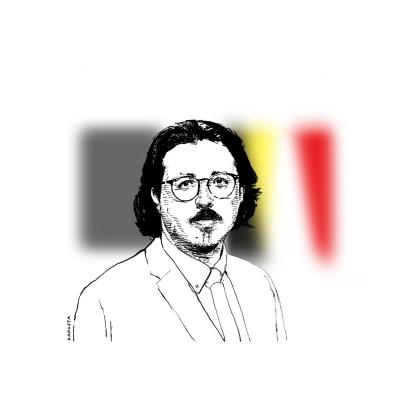
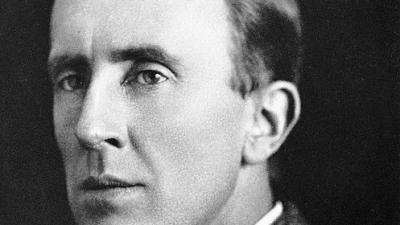

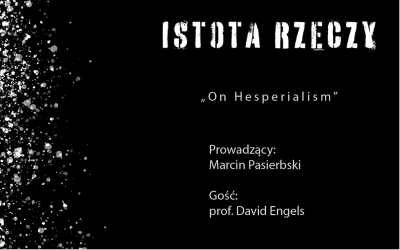

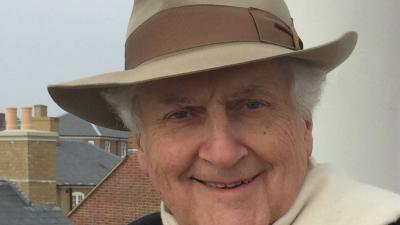

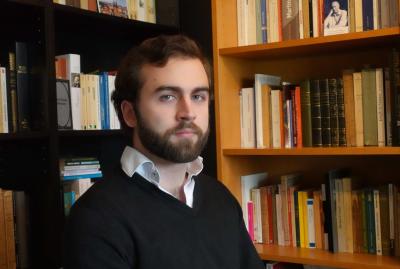

Comments (0)